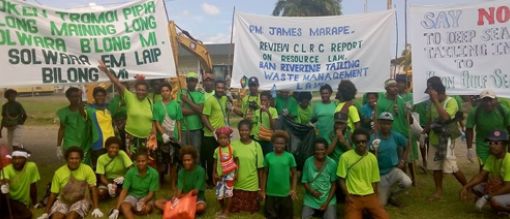Today, a coalition of PNG and Australian civil society organisations called on the proponents of the Wafi-Golpu mine to stop progression of the mine because the project has not yet gained the consent of communities in Morobe Province.
PNG organisations, the Centre for Environmental Law and Community Rights (CELCOR) and the Evangelical Lutheran Church of Papua New Guinea, and Australian groups Jubilee Australia and the Mineral Policy Institute sent an open letter to the Prime Minister, Deputy Prime Minister, Mining Minister, Minister for Environment, Conservation and Climate Change and the Mineral Resources Authority requesting a halt of any further approvals until discussions can be had with all affected project communities, including those in the Huon Gulf.
This is in response to news reports that the State Negotiation Team is approaching the completion of its talks with Wafi Golpu SML landowners. The project, which is being pursued by two Australian companies Newcrest and Harmony Gold, is currently entering the final stages of approval.
About 400,000 people living along the Huon Gulf stand to be impacted everyday by the mine’s waste being dumped into the ocean, and they have not consented to the mine. Coastal communities depend upon the sea for everything – including their food every day. Fishing in the pristine Huon Gulf means that families are subsequently able to afford to pay for their children’s education, buy clothes, food and afford basic necessities.
The Wafi-Golpu project, a copper and gold mine, is anticipated to take approximately 5 years to construct, and will last at least 28 years. Over its life, the mine will produce 360 million tonnes of tailings waste, (360 billion kilograms) the majority of which, if not all, will be dumped directly into the beautiful waters of the Huon Gulf.
Mr Peter Bosip, the Executive Director of the Center for Environmental Law and Community Rights Inc (CELCOR), said:
We do not believe that the company or the Government have gained the consent of the people of the Huon Gulf to dump mine waste in their sea waters. The Government should stop pushing this project through at once.
Communities are concerned about:
-
potential short and long term environmental impacts on the marine ecosystem;
-
potential impacts on fish stocks, which could impact the thousands of families who depend on the Huon Gulf for access to fish;
-
potential impacts on their livelihoods, including ability to earn an income to support their families and also to support the work of the church;
-
the potential for pipelines, which stretch more than 130km to burst or spill, damaging watercourses, agricultural land, villages or forests;
-
being deprived of agricultural land to produce food as a result of the pipeline;
-
being unable to swim at Wagang Beach due to concerns regarding pollution;
-
the impact of climate change on the proposal to dump mining waste into the ocean – including whether storm surges, flooding or tsunamis could sweep waste inland.
Mr Bosip said:
We believe that these concerns are significant and merit further attention on a national scale. Scientists have already found environmental impacts at Lihir, which is also run by Australian company Newcrest, and which has dumped waste into the ocean since 1996.
Bishop Dr. Jack Urame, said:
Communities do not agree with the dumping of waste into the sea, because it is their livelihood/. We are concerned about the future – for our children, and our grandchildren. As the Church, we stand with our parishioners. We believe that their concerns are valid and must be heard before approval of this project can be granted.
The Wafi-Golpu Joint Venture is run by Newcrest PNG2 Limited and Wafi Mining Limited, which are both subsidiaries of Australian companies: Newcrest, and an Australian subsidiary of South African company, Harmony Gold.
Australian-based NGOs the Mineral Policy Institute and Jubilee Australia endorsed the concerns of CELCOR and the Evangelical Lutheran Church.
Dr Luke Fletcher, Executive Director, Jubilee Australia, said:
Dumping mining waste into the ocean, and over 28 years, as this proposal suggests, would never be permitted in Australia. In fact, it would not be permitted for one day. This proposal represents a gross breach of corporate social responsibility on behalf of not one but two Australian companies. The companies must desist in their efforts to move this project forward and agree to our request for a meeting before taking any further steps.
Dr Charles Roche, Director of the Mineral Policy Institute, said:
For an Australian company to push ahead with this project, while there is still clear opposition from the communities who stand to lose the most, is unconscionable.
You can find the open letter from Civil Society to the Prime Minister, Deputy Prime Minister, Mining Minister, Minister for Environment, Conservation and Climate Change and the Mineral Resources Authority here.
